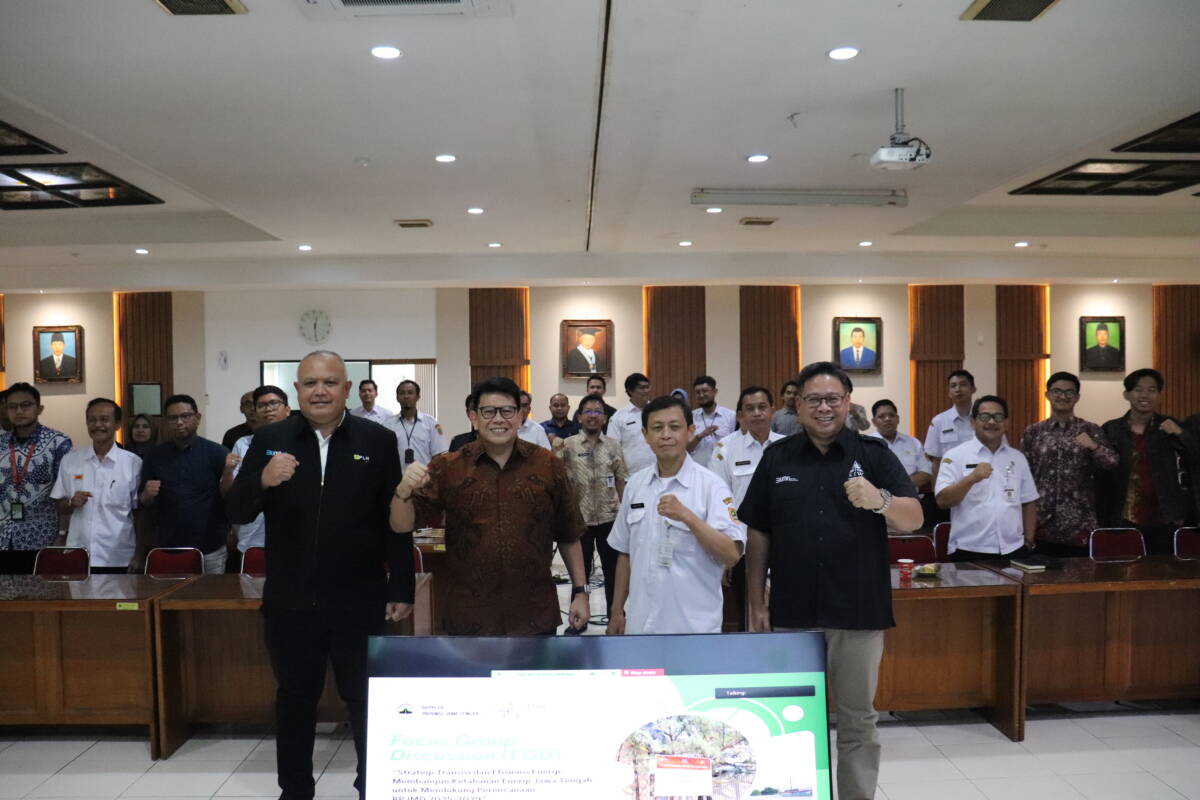Central Java, September 11, 2024 – Central Java Province plays a crucial role in the efforts to achieve sustainable energy transition in Indonesia. With its abundant renewable energy potential, such as solar power, Central Java is at the forefront of realizing the vision of an energy transition that supports energy resilience and reduces dependence on fossil fuels. As part of the regional medium-term development plan (RPJMD) for 2025-2029, energy transition and efficiency strategies need to be strengthened to ensure sustainability and community welfare.
In its efforts to develop the Regional Medium-Term Development Plan (RPJMD) for Central Java Province for the 2025-2029 period, the Regional Development Planning Agency (BAPPEDA) of Central Java, in collaboration with the Institute for Essential Services Reform (IESR), held a Focus Group Discussion (FGD) titled “Energy Transition and Efficiency Strategies: Building Central Java’s Energy Resilience to Support the RPJMD 2025-2029 Planning.” This event aimed to identify opportunities and challenges in accelerating the energy transition and achieving energy resilience in Central Java, in line with the net zero emission (NZE) target.
Nathan Setyawan, Secretary of the Regional Development Planning Agency (BAPPEDA) of Central Java Province, stated that strategic steps are urgently needed to achieve energy sustainability amidst these challenges. According to him, the Central Java Provincial Government faces significant challenges in supporting energy needs as the population continues to grow. Energy demand will keep rising, and this becomes even more pressing amid climate change.
“The Central Java Provincial Government continues to reduce dependence on fossil fuels and promote renewable energy as part of efforts to strengthen energy resilience in Central Java. The renewable energy mix is a key factor in achieving NZE gradually until 2060,” said Nathan.
Fabby Tumiwa, The Executive Director of the Institute for Essential Services Reform (IESR), emphasized that community-scale renewable energy development needs to be encouraged over the next five years to achieve energy resilience. This challenge must be addressed together, involving various stakeholders, including industry and the public. Additionally, the development of biogas and marsh gas in communities is an important step in educating the public on renewable energy utilization.
“To strengthen energy resilience in Central Java, we have proposed several strategic recommendations for the RPJMD 2025-2029, including developing community-based renewable energy potential, such as the Energy Independent Villages, as well as implementing smart grids and clean energy infrastructure in rural areas. Moreover, public campaigns to promote the use of appliances with Minimum Energy Performance Standards (MEPS) are essential to increase energy efficiency at the household and government building levels,” said Fabby.
Fabby further noted that implementing green building standards and energy management in government buildings and public facilities is also proposed to support energy efficiency and carbon emission reduction. With tax incentives for industries and buildings investing in renewable energy, and enhancing the capacity of experts in renewable energy, Central Java can lead the national energy transition more effectively.
Mochammad Soffin Hadi, General Manager of PLN Central Java, mentioned that one of the strategic steps needed is to increase the capacity of renewable energy power plants, such as rooftop solar power plants (PLTS). However, the main challenge of rooftop solar systems is their intermittent nature, which can cause disruptions like those seen in Vietnam, where multiple power outages have occurred.
“To address this, careful planning regarding rooftop solar system quotas is necessary. Currently, the rooftop solar quota in Central Java is 80 MW and will continue to be updated to ensure a stable energy supply. On the other hand, increasing the use of electric vehicles, especially electric motorcycles, is also a major focus. To support this, the construction of Public Electric Vehicle Charging Stations (SPKLU) in Central Java and Yogyakarta is being accelerated,” said Hadi.
Hadi emphasized that by 2024, Central Java targets the construction of six commercial SPKLUs with a plug-and-play system, allowing electric vehicle users to charge easily and quickly. Electrification is also being introduced in the agricultural sector to improve efficiency and productivity. Increasing electrification in agriculture can reduce dependence on fossil fuels and support a broader energy transition in Central Java.
Meanwhile, Ahmad Fauzie Nur, President Director of PT Kawasan Industri Wijayakusuma (KIW) and Chairman of the Central Java Industrial Estate Association (HKI), explained that renewable energy is a key attraction for industrial estates, as more investors are interested in using renewable energy on an industrial scale. Therefore, supporting renewable energy development in industrial estates is crucial.
“The investment potential in Central Java continues to rise, especially in Semarang, which is considered less competitive compared to other major cities in Java. The circular economy is also an important approach, not only providing financial benefits but also supporting resource sustainability in industrial areas,” Ahmad explained.

